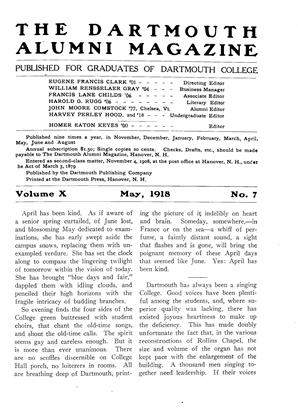The Trustees of the College have accepted a proposal recently offered by a committee of the alumni representatives of the Dartmouth fraternities for the partial closing next year of all fraternity houses. Details of the proposition were left to a newly appointed committee, of which President Hopkins is chairman. In brief, the plan provides for the closing of the dormitory sections of all fraternity houses, a restricted operation of other parts of the houses, and financial assistance from the College to the fraternities in order to help them in meeting their obligations. As a result of this, practically all students will room in the College dormitories next year.
Distribution of funds to the various fraternities will be based on the actual needs of each. Three fraternities, planning to make up their deficits through special appeals to their alumni, have presented budgets demanding no assistance from the College during the coming year. The largest individual request is for $738.
The statement presented to the Trustees by the alumni representatives of the fraternities, which was drawn up by a special committee on fraternity and college co-operation, consisting of E. H. Hunter '01, Professor W. R. Gray '04, and Professor N. E. Gilbert, is as' follows :
"To the President and Trustees of Dartmouth College, "Gentlemen:—
"We, the alumni representatives of the fraternities at Dartmouth College, seeking some way in which the fraternities may co-operate with the College in the solution of its problem of reduced income through vacant dormitories, beg to suggest the following plan for your consideration:
"1. That the fraternities deny their members the privilege of rooming in the fraternity houses from September, 1918, to the end of the war.
"2. That the fraternities keep only those portions of their houses open which are necessary to provide a gathering place for the fraternity men, and that these rooms be heated only during the afternoon and evening hours.
"3. That, by virtue of the financial benefit derived by the College from this arrangement, the College assist the various fraternities in meeting their fixed charges by granting to a central committee, representing these fraternities, a lump annual payment based on estimates constituting the least sums which the several fraternities can accept with any hope of meeting their financial obligations so long as the dormitory sections of their houses remain closed, and aggregating, further, a sum materially less than that to be netted by the College from the arrangement.
"We could wish it were possible to recommend that all fraternity houses close their dormitory sections and force the men into the empty College dormitories; this and no more.
"It must be recognized, however, that the fraternities have their several obligations to meet, just as important to the integrity of the College as a whole as those of the College corporation. Hence the last clause in our suggested plan to the College Trustees.
"From an examination of costs of dormitory operation supplied by the Treasurer of the College, we are able to state that extra men, or men who would otherwise be housed in fraternity building's, can be roomed in College buildings at a net cost (by net we mean the increased cost of operating the College dormitories over that of maintaining the buildings in a closed condition) of $30 to $35 per man. At the larger figure, the net cost of housing 244 fraternity men would be $8,540. These men would aggregat a payment to the College of not less than $24,400 in room rent. Of the difference between this sum and the cost of operation; i.e., $15,860, a sum not to exceed $8,000 would be returned to the fraternity group as a whole for distribution among the individual fraternities according to their need, and the remainder would be retained by the College."
 View Full Issue
View Full Issue
More From This Issue
-
 Article
ArticleHOW JUDAH DANA, DARTMOUTH 1795, WON HIS HANOVER BRIDE
May 1918 By James A. Spalding, '66¹ -
 Article
ArticleCOLLEGE NEWS
May 1918 -
 Article
ArticleMARCH MEETING OF THE TRUSTEES—EXTRACTS FROM THE MINUTES
May 1918 -
 Article
ArticleTHE COLLEGE AND UNIVERSITY PROFESSOR A RELIGIOUS PROBLEM
May 1918 By William Hamilton Wood -
 Article
ArticleLETTER FROM LIEUTENANT J. C. REDINGTON '00
May 1918 -
 Article
ArticleCAMPUS NOTES
May 1918








